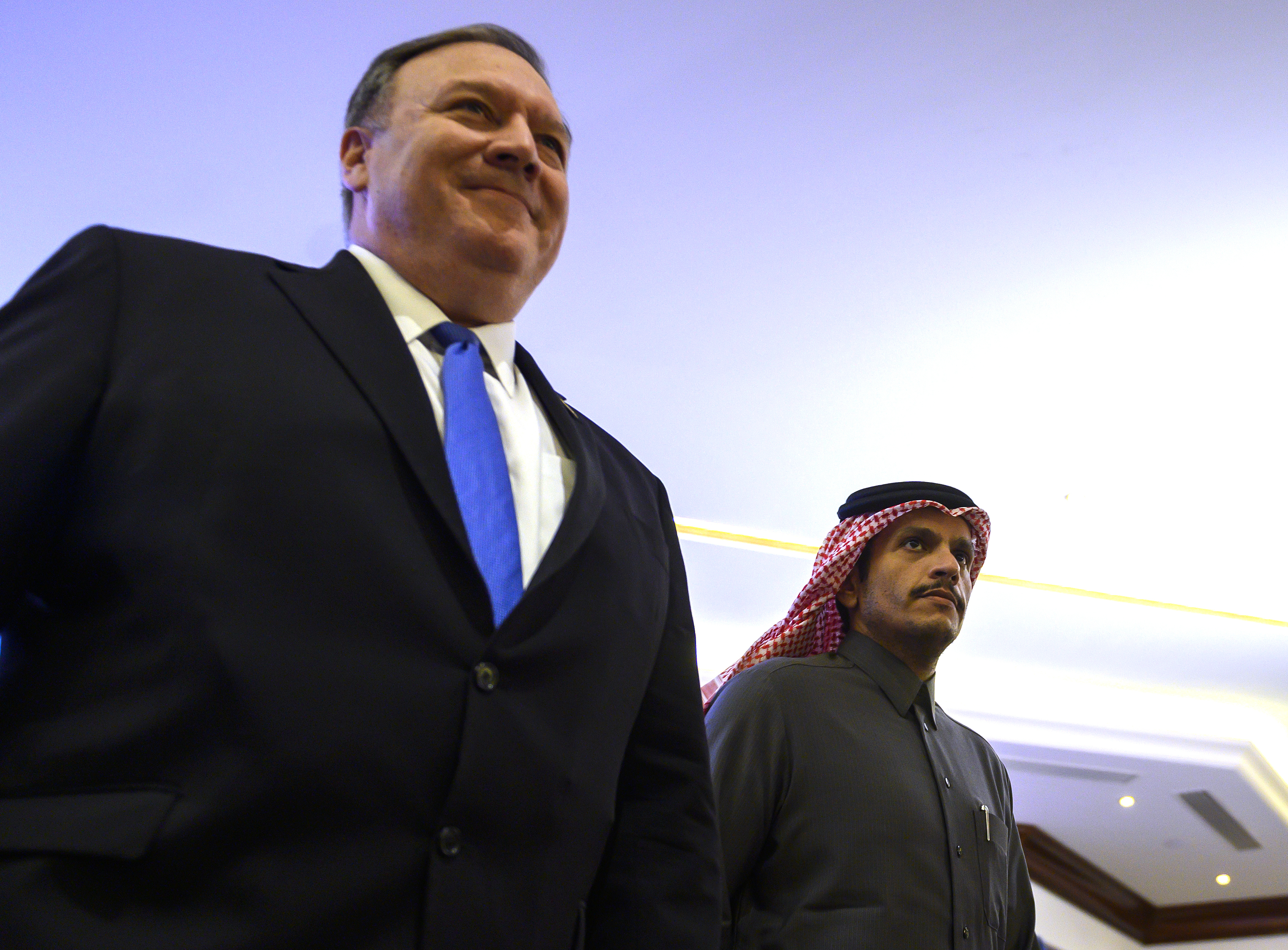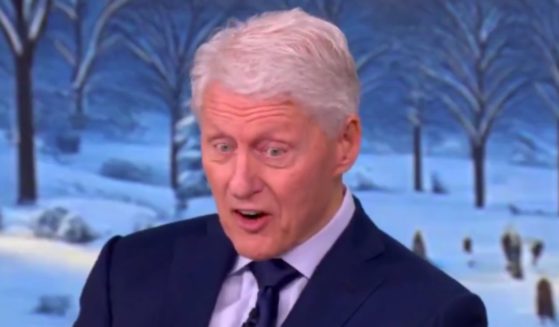
Yemen, Iran, Khashoggi murder top Pompeo's talks in Saudi
RIYADH, Saudi Arabia (AP) — If Mike Pompeo was surprised, he didn’t show it. But the secretary of state had woken up in the capital of Saudi Arabia on Monday to find that President Donald Trump had tweeted a threat to NATO ally Turkey warning of economic harm should the Turks attack U.S.-backed rebel forces in Syria.
On the second-to-last stop of a Mideast tour dominated by questions and concerns from Arab leaders about Trump’s abrupt order to withdraw American troops from Syria, Pompeo had to refer reporters’ questions about the tweet to the White House. He said he assumed Trump was referring to the possibility of economic sanctions on Turkey if the Kurds were hit. But he couldn’t speak definitively to the matter.
“We apply sanctions in many places around the world,” Pompeo said, attempting to clarify Trump’s threat. “I assume he’s speaking about those kinds of things but you would have to ask him.”
The scene at the news conference at the Riyadh airport played out amid what have become frequent unpleasant surprises for Trump administration officials trying to explain the policies of a president who often issues seemingly impulsive tweets and makes off-the-cuff comments that can disrupt the normal course of diplomacy.
Pompeo had not yet spoken to Turkish officials about Trump’s vow to “devastate Turkey economically if they hit Kurds” as he spoke to reporters.
“I haven’t had a chance to have any conversations with the Turks as of yet since the president’s tweets went out, but I will I’m sure I will talk to them before too long,” said Pompeo, who had just come from meetings with Saudi Arabia’s king and crown prince that focused on the conflicts in Syria and Yemen and the murder of Saudi journalist Jamal Khashoggi.
Just two days earlier, Pompeo had expressed confidence after a lengthy conversation with his Turkish counterpart that the U.S. and the Turks would reach an agreement to protect America’s Kurdish partners in the fight against the Islamic State after U.S. troops leave Syria.
Trump’s tweet threat appeared to throw such confidence into doubt, though he and Turkish President Recep Tayyip Erdogan later Monday said they spoke by phone and agreed to work together on the U.S. withdrawal from Syria. Trump also backed away from the economic threat in a later tweet, saying he and Erdogan discussed economic development and the creation of a 20-mile buffer zone along Turkey’s border with Syria.
The president has repeatedly wreaked havoc with diplomacy, whether from the Syria withdrawal order and subsequent confusion over timing to suggestions that the American military presence in Afghanistan may be significantly reduced. He has also done it with comments throwing into question the U.S. commitment to NATO and about the pace and progress of trade talks with China.
The Syria order was too much for Defense Secretary Jim Mattis and the special envoy for the anti-IS coalition Brett McGurk, both of whom quit as a result. But they left on their own terms. Former Secretary of State Rex Tillerson, who was several times blindsided by Trump tweets, was fired via social media last year.
Others, like Pompeo, have gamely played on, joining Trump in accusing the media of inventing internal policy contradictions in the face of clear discord or at least confusion.
Pompeo’s eight-nation Mideast mission was aimed at reassuring Arab allies that the Syria withdrawal doesn’t mean the administration is abandoning the region.
The secretary said he managed to allay fears of an American retreat even as the U.S. military begins the Syria withdrawal process.
He at once defended the Syria withdrawal while insisting the administration is in it for the long haul in destroying the Islamic State and combatting Iran’s increasing assertiveness in Syria, Lebanon, Iraq and Yemen.
He did so in part, he said on Saturday in Abu Dhabi, by bashing the previous administration’s Mideast policies as naive and misguided and extoling the virtues of Trump’s vision for the region.
“It is the case they get it, they understand,” Pompeo said of the Arab leaders with whom he spoke.
And still, questions remain.
On Tuesday in Amman, Jordan’s Foreign Minister Ayman Safadi held out hope that U.S.-Jordanian cooperation on Syria would continue but seemed uncertain. “We’ve always coordinated and we trust that we’ll continue to coordinate, and our security is something that has always been taken into account by our allies in Washington, and we trust that we’ll continue to have this kind of relationship,” he said.
In Cairo on Thursday, Egyptian Foreign Minister Sameh Shoukri noted pointedly that IS has been largely defeated but “the overall network of terrorist organizations goes far beyond that.”
Shoukri’s spoke shortly before Pompeo delivered a speech at the American University of Cairo in which he accused former President Barack Obama of “misguided” thinking that diminished the U.S. role in the region, led to the rise of the Islamic State and emboldened Iran.
Unsurprisingly, Pompeo’s speech was panned by former Obama administration officials and foreign policy experts who complained it celebrated autocrats and made no mention of human rights abuses that sparked the 2011 Arab Spring uprisings that convulsed the Middle East and North Africa.
“Obviously the Pompeo speech, read alongside Obama’s, seems a little nasty and undignified but in diplomacy you get judged by results, not by classiness,” said former U.S. diplomat Steven Sestanovich, a senior fellow at the Council on Foreign Relations. “And the results test may be the one Pompeo fails: Has he really reduced confusion about where the US is headed?”
Pompeo in Abu Dhabi denied he had attacked Obama, but only “the ideas that underlaid the previous administration’s policies.”
He added that most of his speech was intended to describe how the Trump administration is adjusting policies to fix problems such as the Islamic State.
And yet, those adjustments are coming fast and furious with often no or little warning, making the job of communicating them that much more difficult.
The Western Journal has not reviewed this Associated Press story prior to publication. Therefore, it may contain editorial bias or may in some other way not meet our normal editorial standards. It is provided to our readers as a service from The Western Journal.
Truth and Accuracy
We are committed to truth and accuracy in all of our journalism. Read our editorial standards.
Advertise with The Western Journal and reach millions of highly engaged readers, while supporting our work. Advertise Today.












